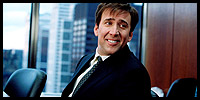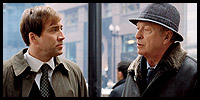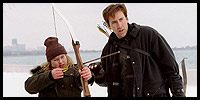
 |
|
The Weather Man (2005) Cast: Nicolas Cage, Michael Caine, Hope Davis, Gemmenne de la Pena, Nicholas Hoult, Michael Rispoli, Gil Bellows, Judith McConnell, Bryant Gumbel 2005 – 102 minutes Rated: Reviewed by Dustin Putman, October 26, 2005.  Directed by the versatile, genre-hopping Gore Verbinski (2002's "The Ring"), "The Weather Man" is light on easily marketable plotting but rich with the sort of details about life, career, and relationships that will have many viewers nodding their head with empathy and understanding. A quirky, equally very funny and sad slice-of-life, the film ventures behind the eyes of put-upon news weather man David Spritz (Nicolas Cage) and stays there for the duration of its entertaining 102-minute running time. In viewing his life from all spectrums during the months of an especially icy and bitterly cold Chicago winter, Verbinski and screenwriter Steve Conrad walk past expectational stereotypes to present characterizations and story developments that are almost continually natural and painfully real.
Directed by the versatile, genre-hopping Gore Verbinski (2002's "The Ring"), "The Weather Man" is light on easily marketable plotting but rich with the sort of details about life, career, and relationships that will have many viewers nodding their head with empathy and understanding. A quirky, equally very funny and sad slice-of-life, the film ventures behind the eyes of put-upon news weather man David Spritz (Nicolas Cage) and stays there for the duration of its entertaining 102-minute running time. In viewing his life from all spectrums during the months of an especially icy and bitterly cold Chicago winter, Verbinski and screenwriter Steve Conrad walk past expectational stereotypes to present characterizations and story developments that are almost continually natural and painfully real.
 A deeply flawed and misdirected man whose family has unraveled with the separation of himself and ex-wife Noreen (Hope Davis), David Spritz unknowingly curses like a sailor, is constantly being pummeled by drive-by food-throwing from disgruntled viewers of the news program he works for, and makes a valiant attempt to involve himself in the lives of his children, 15-year-old Michael (Nicholas Hoult) and overweight 12-year-old Shelly (Gemmenne de la Pena), despite no longer existing under the same roof. With Noreen getting serious with new-man-in-her-life Russ (Michael Rispoli), David watches as his chance for reconciliation shrinks with each passing day. Further distressing is the advanced form of lymphoma cancer his father, retired writer Robert (Michael Caine), is diagnosed with.
A deeply flawed and misdirected man whose family has unraveled with the separation of himself and ex-wife Noreen (Hope Davis), David Spritz unknowingly curses like a sailor, is constantly being pummeled by drive-by food-throwing from disgruntled viewers of the news program he works for, and makes a valiant attempt to involve himself in the lives of his children, 15-year-old Michael (Nicholas Hoult) and overweight 12-year-old Shelly (Gemmenne de la Pena), despite no longer existing under the same roof. With Noreen getting serious with new-man-in-her-life Russ (Michael Rispoli), David watches as his chance for reconciliation shrinks with each passing day. Further distressing is the advanced form of lymphoma cancer his father, retired writer Robert (Michael Caine), is diagnosed with.
 A sign of light arises when David gets the chance to audition for New York's prestigious "Hello America" show, hosted by Bryant Gumbel, but he is torn about the career change because it would take him away from his kids for longer periods of time and would mean that he has given up on his pipe dream of being an author. After all, does he really want to live out the rest of his days doing a job that is based on educational guessing and that he compares to fast-food? "It tastes okay," he says in voice-over, "but provides next to no actual nourishment."
A sign of light arises when David gets the chance to audition for New York's prestigious "Hello America" show, hosted by Bryant Gumbel, but he is torn about the career change because it would take him away from his kids for longer periods of time and would mean that he has given up on his pipe dream of being an author. After all, does he really want to live out the rest of his days doing a job that is based on educational guessing and that he compares to fast-food? "It tastes okay," he says in voice-over, "but provides next to no actual nourishment."
 "The Weather Man" gets a lot of its unsentimental pleasures out of the three-dimensionally conceived relationships between David and his family members. Noreen is not written as a harping shrew, but a woman who cares that David stays in touch with his children and is probably more civil to him now than when they were together and constantly at each other's throats. His kids, Michael and Shelly, have their own sets of issues—he is in rehab for marijuana use and blind to the sexual advances of his counselor, Don (Gil Bellows), while she secretly has begun smoking and seems to be under a never-ending cloud of moroseness—but are never viewed as resentful of their father. Overall, they seem to be fairly well-adjusted in the annals of rebellious movie teens.
"The Weather Man" gets a lot of its unsentimental pleasures out of the three-dimensionally conceived relationships between David and his family members. Noreen is not written as a harping shrew, but a woman who cares that David stays in touch with his children and is probably more civil to him now than when they were together and constantly at each other's throats. His kids, Michael and Shelly, have their own sets of issues—he is in rehab for marijuana use and blind to the sexual advances of his counselor, Don (Gil Bellows), while she secretly has begun smoking and seems to be under a never-ending cloud of moroseness—but are never viewed as resentful of their father. Overall, they seem to be fairly well-adjusted in the annals of rebellious movie teens.
 Perhaps the heart of "The Weather Man," and the part most poignant and resonant, is David's relationship with his dad, Robert. David loves Robert, valuing his opinions so much that it pains him that his own father has never acknowledged any of his personal successes or aspirations. Take a scene early on, for example, when David receives an offer to audition for the news program in Manhattan and places the paper on his passenger's car seat so his father will see it. When Robert gets in, he sits on it. Later, David puts it in front of him on the dashboard, and still Robert pays no attention. In an attempt to follow in his father's footsteps, David has spent four years writing a novel that he later learns Noreen actually hated, feeling that he wasted time making a piece of badly-written trash. When the dying Robert ultimately comes around and gives David the acceptance he has always yearned for, it is a scene of heartbreaking power that puts to use Bob Seger's "Like a Rock" in an unforgettable way that the well-known truck commercials could ever dream of.
Perhaps the heart of "The Weather Man," and the part most poignant and resonant, is David's relationship with his dad, Robert. David loves Robert, valuing his opinions so much that it pains him that his own father has never acknowledged any of his personal successes or aspirations. Take a scene early on, for example, when David receives an offer to audition for the news program in Manhattan and places the paper on his passenger's car seat so his father will see it. When Robert gets in, he sits on it. Later, David puts it in front of him on the dashboard, and still Robert pays no attention. In an attempt to follow in his father's footsteps, David has spent four years writing a novel that he later learns Noreen actually hated, feeling that he wasted time making a piece of badly-written trash. When the dying Robert ultimately comes around and gives David the acceptance he has always yearned for, it is a scene of heartbreaking power that puts to use Bob Seger's "Like a Rock" in an unforgettable way that the well-known truck commercials could ever dream of.
 Nicolas Cage (2005's "Lord of War") is brilliant as David Spritz in one of the year's best performances. Cage never steps wrong in a tricky role that could have so easily come off as simply insufferable, but never does. Unapologetic in presenting his harried temper and weaknesses, Cage nevertheless portrays this man as one of good intentions and a warm heart underneath his sinking melancholia. Cage garners big laughs through his expert comic timing, but is just as effectively sound in conveying the rising drama of a person pounded with confusion and bad luck. The rest of the ensemble is first-rate without an uneven seed in the bunch, with Hope Davis (2005's "Proof") turning in yet another supremely fine turn as ex-wife Noreen, Michael Caine (2005's "Bewitched") as solid as he's been in years as father Robert, and Nicholas Hoult (2002's "About a Boy") and Gemmenne de la Pena (2000's "Erin Brockovich") standout unaffected young thespians as children Michael and Shelly.
Nicolas Cage (2005's "Lord of War") is brilliant as David Spritz in one of the year's best performances. Cage never steps wrong in a tricky role that could have so easily come off as simply insufferable, but never does. Unapologetic in presenting his harried temper and weaknesses, Cage nevertheless portrays this man as one of good intentions and a warm heart underneath his sinking melancholia. Cage garners big laughs through his expert comic timing, but is just as effectively sound in conveying the rising drama of a person pounded with confusion and bad luck. The rest of the ensemble is first-rate without an uneven seed in the bunch, with Hope Davis (2005's "Proof") turning in yet another supremely fine turn as ex-wife Noreen, Michael Caine (2005's "Bewitched") as solid as he's been in years as father Robert, and Nicholas Hoult (2002's "About a Boy") and Gemmenne de la Pena (2000's "Erin Brockovich") standout unaffected young thespians as children Michael and Shelly.
 With palpably chilly and sumptuous cinematography by Phedon Papamichael (2004's "Sideways") of a snow-drenched Chicago that matches the oftentimes bleak mood of David, "The Weather Man" superbly mixes darkness with effortless comedy without ever becoming overly depressing or silly. Only in the subplot involving Michael and would-be molester Don does the picture stumble; when forced to face the subject matter head-on, it recoils and wimps out, making this whole section an ill fit with the rest of the themes and stories. Otherwise, "The Weather Man" is in ideal hands with director Gore Verbinski, who juggles varying tones and many different relationship threads with intelligence and sympathetic insight. This may not be a textbook example of mainstream entertainment, but it's all the better for it, avoiding possible pre-packaged, watered-down temptations for a humanistic tale altogether truer and more perceptive than the majority of studio offerings. In a fall season of bigger, more easily describable commercial films, "The Weather Man" is deserving of attention and praise.
With palpably chilly and sumptuous cinematography by Phedon Papamichael (2004's "Sideways") of a snow-drenched Chicago that matches the oftentimes bleak mood of David, "The Weather Man" superbly mixes darkness with effortless comedy without ever becoming overly depressing or silly. Only in the subplot involving Michael and would-be molester Don does the picture stumble; when forced to face the subject matter head-on, it recoils and wimps out, making this whole section an ill fit with the rest of the themes and stories. Otherwise, "The Weather Man" is in ideal hands with director Gore Verbinski, who juggles varying tones and many different relationship threads with intelligence and sympathetic insight. This may not be a textbook example of mainstream entertainment, but it's all the better for it, avoiding possible pre-packaged, watered-down temptations for a humanistic tale altogether truer and more perceptive than the majority of studio offerings. In a fall season of bigger, more easily describable commercial films, "The Weather Man" is deserving of attention and praise.
|
© 2008 by Dustin Putman |














